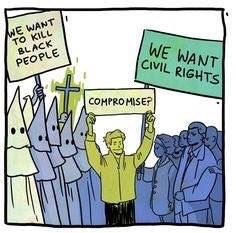I have been thinking about this for a while too.
I don’t have the time, money, or other resources to make a meaningful impact with anything.
Well, actually - I do. Most people do. But if we did, we’d be making significant personal sacrifices. I already don’t have enough time to do anything I really enjoy (like watching movies) or things I should be doing for one reason or another (like exercising).
It’s a symptom of the modern age - despite huge advances in productivity and efficiency, inequality on an outrageous scale means that most people are either under-employed (so no resources, and time spent not looking for work is seen as wasted by society) or over-worked (probably can write a check to charity, but many of the over-worked are under-paid).
(Inequality is, of course, also why charity/social justice/etc. awareness is necessary in the first place…)
So what are people supposed to do? Many resort to solidarity gestures to feel better about themselves, and you can’t blame them. I suspect (well, I hope) that most recognize that it’s largely pointless.
I don’t participate in the sorts of solidarity gestures implied here, but I think there are some useful examples of where it may not be so bad.
A little while back after the inauguration there was a women’s equality protest. Women (who were privileged to be able to without repercussion anyway) skipped work to show how important they are to society. Here, a show of solidarity from everyone else is useful - even just men wearing a “The Future is Female” t-shirt that day. In a sort-of similar but more general vein, using symbols (on your car, your computer, whatever) like the equals-sign symbol or a rainbow flag to show solidarity with or support for LGBTQ people is meaningful and useful.
Of course, there’s a problem when compliance becomes deemed mandatory. This is an issue with Remembrance Day poppies in countries that have that tradition - people make a big deal out of politicians and celebrities not wearing a poppy, making it essentially mandatory for all.
That ruins what is otherwise a moving and effective gesture of remembrance and honor.
It’s that kind of societal- and peer-pressure to participate in these gestures of solidarity that, I think, is a big part of what leaves a bad taste in our mouths. We may support the cause vigorously but we’re being pressured into doing these things that everyone knows are useless gestures.
Another thing… I think the way people actually become aware of the kinds of things that have awareness campaigns is through TV and movies and other popular media. I know far more about MS from The West Wing than anyone ever learns about it from MS walks and other awareness and charity things related to MS. People “get” autism from watching Rain Man (or Atypical on Netflix for a more complex view), not from Autism Speaks (an organization made up entirely of people without autism - people basically looking for “cures” for their children whom they can’t accept as they are - but nobody knows that because it’s all about meaningless and shallow “awareness”).
